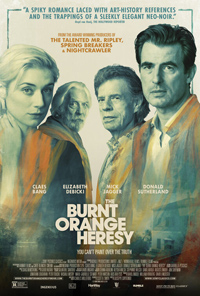Pleasure to Burn: Capotondi Returns with Entertaining Neo-Noir
 Murder really can be turned into art, it seems, in Giuseppe Capotondi’s return to narrative filmmaking with The Burnt Orange Heresy, his first film in a decade since his well-received debut, 2009’s The Double Hour (which at one point was set to be re-made in English by Joshua Marston). Capotondi turns to something a bit more lavishly cosmopolitan in this thriller which explores the intersection of art, commerce, blackmail and dreams deferred with an exceptional international cast. The film closed the 2019 Venice Film Festival and while it’s enigmatic title isn’t likely to drive the masses to the art-house, the film (adapted by Scott B. Smith, scribe of A Simple Plan and The Ruins) is an entertaining genre piece, based on a novel by Charles Willeford (whose works have inspired films by Monte Hellman, George Armitage and Robinson Devor).
Murder really can be turned into art, it seems, in Giuseppe Capotondi’s return to narrative filmmaking with The Burnt Orange Heresy, his first film in a decade since his well-received debut, 2009’s The Double Hour (which at one point was set to be re-made in English by Joshua Marston). Capotondi turns to something a bit more lavishly cosmopolitan in this thriller which explores the intersection of art, commerce, blackmail and dreams deferred with an exceptional international cast. The film closed the 2019 Venice Film Festival and while it’s enigmatic title isn’t likely to drive the masses to the art-house, the film (adapted by Scott B. Smith, scribe of A Simple Plan and The Ruins) is an entertaining genre piece, based on a novel by Charles Willeford (whose works have inspired films by Monte Hellman, George Armitage and Robinson Devor).
James Figueras (Claes Bang) is an enigmatic critic, wannabe painter and sometimes charlatan. When renowned art dealer Joseph Cassidy (Mick Jagger) invites him to attend his exclusive mansion on Lake Como, Cassidy brings along budding love interest Berenice (Elizabeth Debicki), a woman who seems to be running from something. However, Cassidy’s intentions regarding Figueras are more sinister than he’d realized. At the periphery of Cassidy’s estate resides reclusive painter Jerome Debney, an ex-pat whose works burned up in 1968 France and whose output has remained private ever since. But Cassidy wants a Debney painting for his collection and he hires Figueras to interview Debney and thus convince him to sell a painting—or else Cassidy will expose some of the art critic’s shadier past dealings.
While everything spins predictably out of control for the pretentious, unabashedly villainous Figueras, Capotondi has a lot of fun getting there, even from its rather sinister set-up, whereby the subtext of the troubled relationship between critic and artist are outlined in a book and lecture on ‘the power of the critic’ written by Figueras. Debicki is a bit harder a characterization as her continued involvement plays like an archaic composite of a compromised woman and one wonders why the script couldn’t conjure something a bit more malevolent for her contemporary climes. Bang, in his best performance since Ruben Ostlund’s The Square (2017) fits this smarmy, pretentious composite like a well-grooved glove. Donald Sutherland gets to play a daffy artist who shares some surprisingly profound exchanges with Debicki, but it’s Mick Jagger who walks away with the film’s finest moments as a constantly amused, unabashedly elitist art dealer (and perhaps his finest on-screen moments since Nicolas Roeg and Donald Cammell’s 1970 Performance).
★★★/☆☆☆☆☆


